Have you, or someone close to you, noticed suspicious activities on your Facebook account? Chances are, it's not by accident. We'll show you how to tell if your Facebook account has been breached and what to do to regain your online privacy on the popular social media platform.
Due to their popularity and dubious security measures, social media accounts quickly became prime targets for hackers seeking to steal personal data, spread malware, or perpetrate fraud. Facebook, with its vast user base and wealth of personal data, is particularly susceptible to these attacks.
In this article, we'll explore the common indicators that your Facebook account may have been compromised and provide step-by-step instructions on how to secure it. Whether you're a casual user or a social media enthusiast, understanding these warning signs can help you act swiftly to mitigate potential large-scale damage.
How to check if your Facebook account has been hacked
Facebook actually offers a simple but very effective way to check on the platform if your account has been hacked. All you need to do is follow these simple steps:
1. Go to your Facebook profile.
2. Select Settings and Privacy from the account drop-down menu.
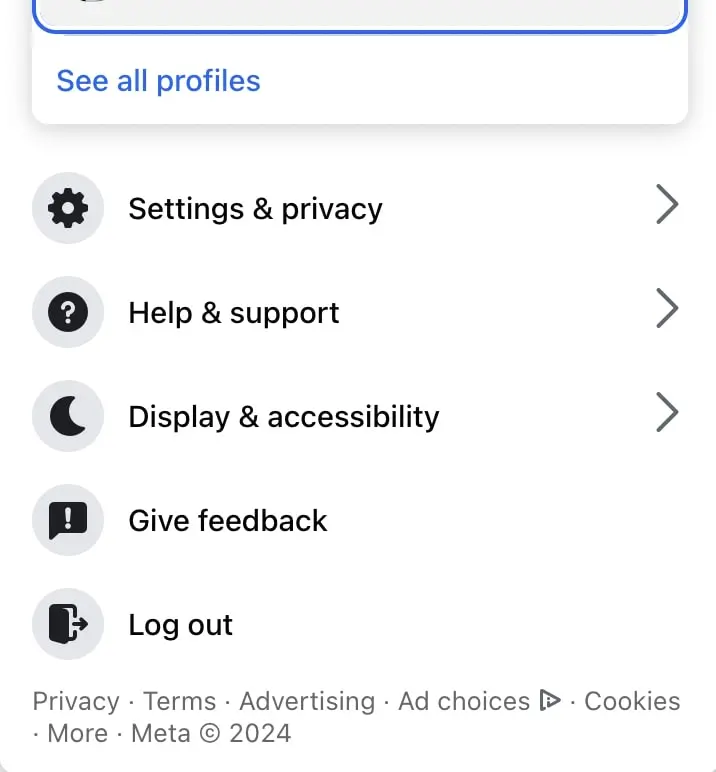
3. Choose Settings > Accounts Centre > Passwords and security.
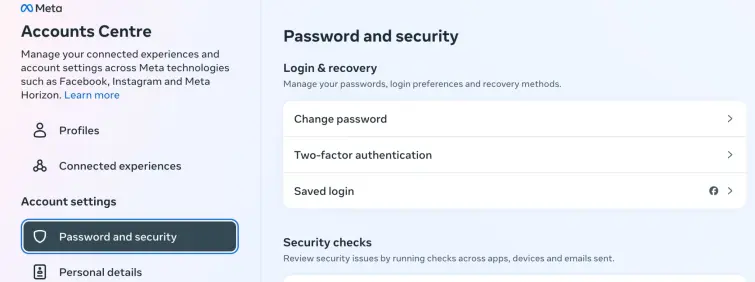
4. Select the option which will show you Where you're logged in.
5. There, you'll find Recent login activity, which will show you where you logged in the last few months and from which devices. Any suspicious location and device should be inspected, and the Log out option is readily available for those you don't recognize.
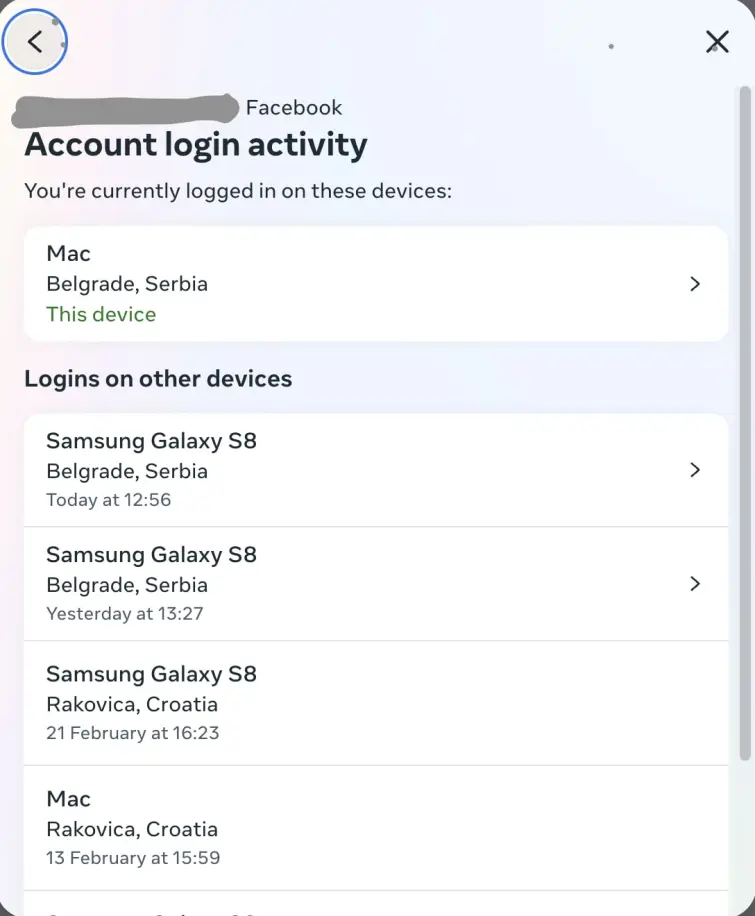
However, it's not always easy to remember where you logged in at a given moment and from which device. Besides, somebody with the exact same device could have hacked your account from your own neighborhood. For peace of mind, you should always check for the other signs of your Facebook account breach.
Other signs someone tampered with your Facebook account
You checked your recent Facebook login activity, but you're not sure whether it was all you. Here are other indications that someone's been tampering with your Facebook account:
- Your personal information has changed – If you notice your email address or password is different, or you're unable to log in, that's an alarming sign that someone else has broken into your Facebook account. Other than that, if your name, birthday, or any other information on your profile has changed, it could also indicate an account breach.
- Unusual friend request approvals – People you don't know have been approving friend requests you didn't send. It means somebody else did it after hacking your account.
- Odd messages or correspondences in your inbox – It's another clear sign that somebody else is abusing your Facebook profile.
- Posts or ads on your Facebook profile that you haven't created – It means somebody else is using your profile to write their thoughts or promote stuff.
If you notice any indications that your Facebook account was compromised, it's time to disconnect all devices found in Recent login activity and reset your passwords on Facebook and other related platforms (such as Instagram). Keep reading to learn more about the Facebook breach remedies and general protective measures.
What do you do if your Facebook account has been compromised?
If your Facebook account has been compromised, it's crucial to take immediate action to secure it and prevent further damage. Here are the steps you should follow:
1. Log out of all devices
As explained above, it's really important to log out of Facebook on all devices as soon as you notice a breach in your account. This simple step enables you to dismiss your hacker from your profile and changing your passwords ensures it stays that way.
In your Account Centre look up the Password and Security settings. Click on the Where you're logged in section and scroll to the bottom of the list. There you'll find the Select devices to log out option. Tick all the boxes, except the one showing your current usage, to ensure that all the other active sessions are terminated. Your hacker is somewhere among those.
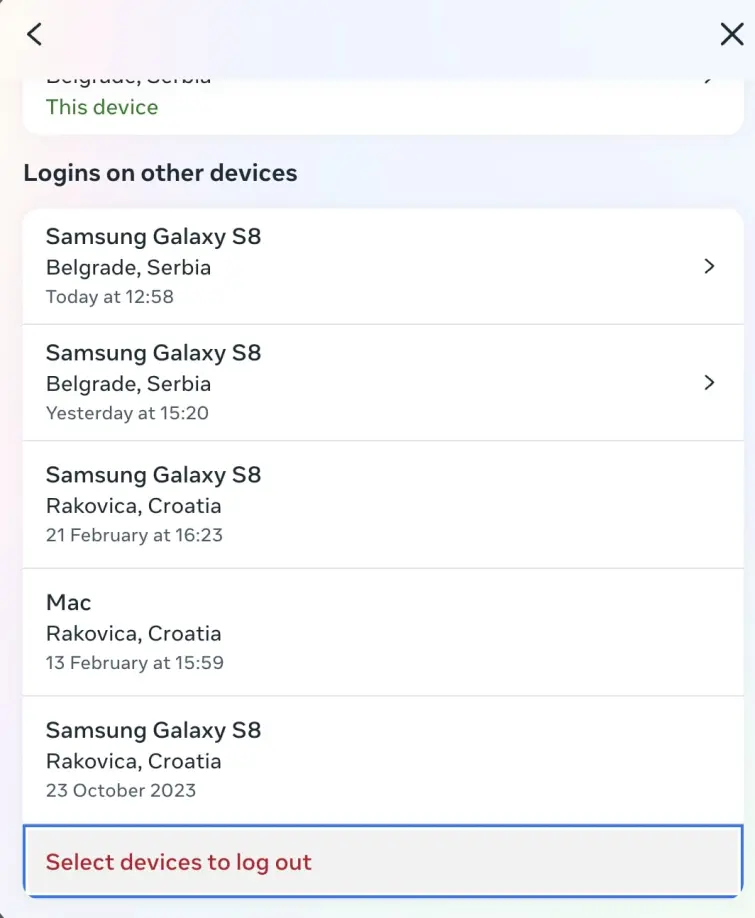
2. Change your passwords
After logging out of all devices except your current one, go back to Facebook and change your password.
Navigate to Settings & Privacy > Accounts Centre > Password and Security.
Under the Password and Security section, select Change password and follow the prompts to set a completely new, stronger password. Make sure this password is unique for Facebook.
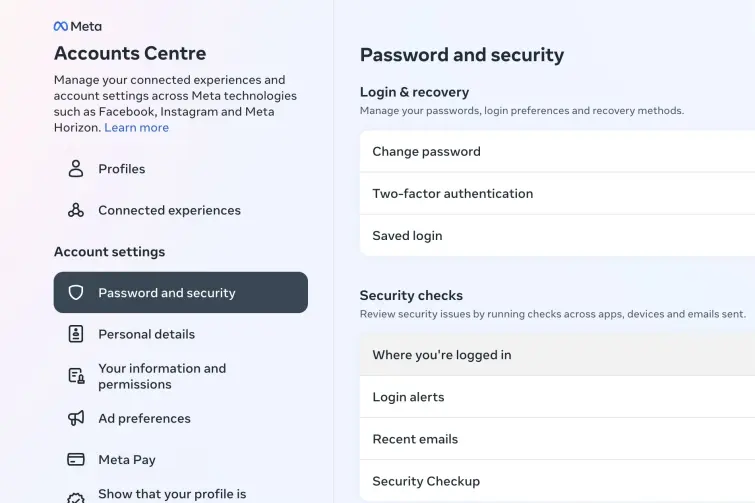
3. Enable two-factor authentication (2FA)
If you wish to bolster your Facebook account security, you can always set two-factor (2FA) authentication on top of changing your password. That way, instead of simply hacking your Facebook credentials, a malicious actor would also need to gain access to the device where you receive the authentication code. This, of course, significantly reduces the chances of security breaches on the social media platform.
Still in the Password and security settings, find the two-factor authentication section. Select the account you wish to secure this way and follow the instructions to enable this advanced security measure.
4. Check for unauthorized changes, and reverse them if possible
Once the most important security steps have been taken, review your other account settings. Check if your email address, phone number, and other information are still the same to ensure no unauthorized changes have been made. Check your Facebook messenger to see if the conversations are all yours. Finally, check the activity log for any unfamiliar posts or activities.
5. Report the incident to Facebook
Go to Facebook's Help Centre and navigate to the Policy and Reporting section, choose the Hacked and fake accounts option, and follow the instructions to report the issue to Facebook and request assistance. This step is important because it helps Facebook improve its security measures for you and others in the future.
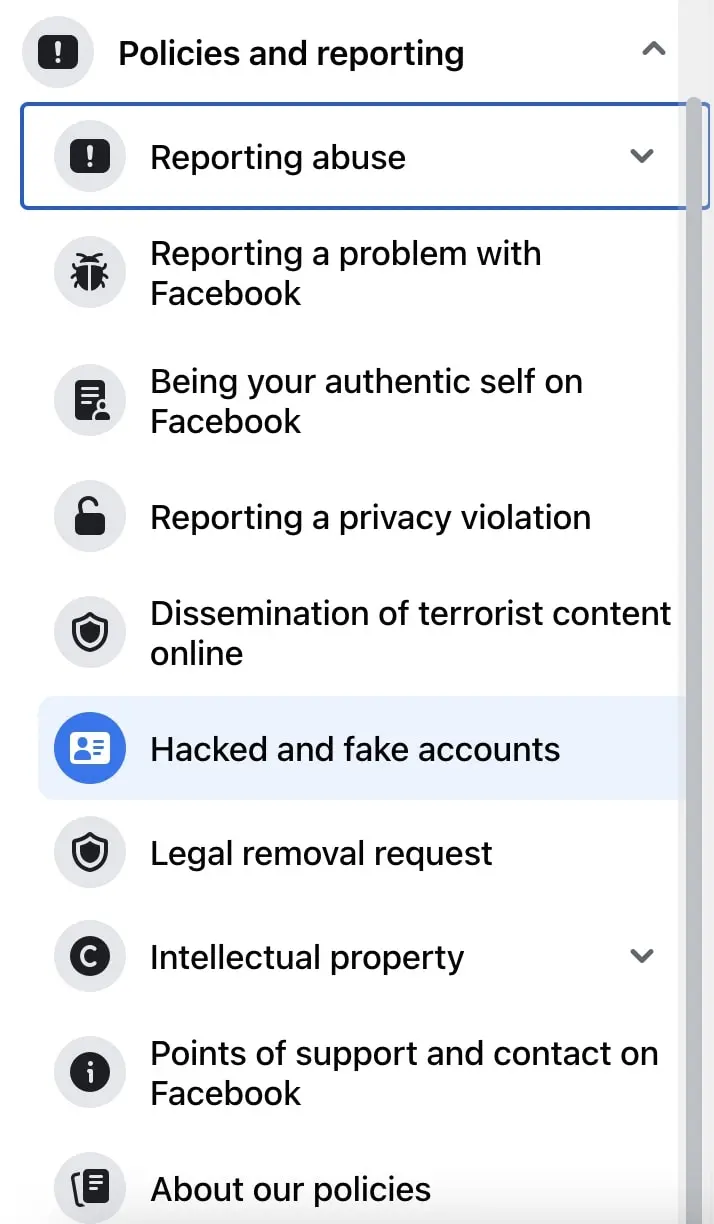
6. Scan your device for malware
If you have been involved in a Facebook account breach, you are likely also a victim of a malware attack – they simply go together. Use a reputable antivirus or anti-malware program to scan your devices for any malicious software that may have been implemented during the breach, or, possibly even, contributed to it.
7. Inform friends and family
Notify your family and friends that your account was compromised to prevent them from falling victim to any potential scams or phishing attempts coming from your account. A simple Facebook post or a chain/group message should do (once you've taken all the other security steps from above). You can also call some of them personally, especially those most susceptible to scams (elderly, etc.).
8. Review related apps and online accounts
By clearing and securing your Facebook alone, you're still not out of the woods. Many apps and platforms work closely with the popular social media site, so you need to review them as well.
Visit Settings & privacy > Settings > Apps and websites.
Remove any suspicious or unfamiliar apps that have access to your Facebook account. You should also change your passwords on Instagram, WhatsApp, and any other platforms owned by Meta. This significantly minimizes the risk of further unauthorized access or damage.
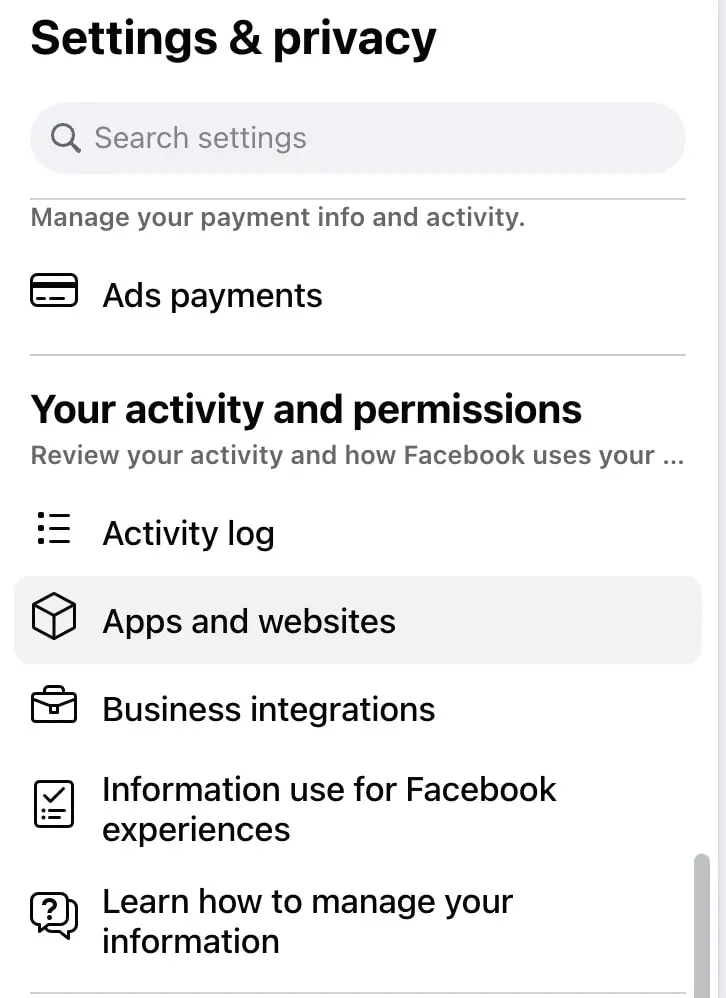
How to protect your Facebook account from hackers
Even if you have never fallen victim to a hacking attack, securing your Facebook account is a crucial step in protecting your sensitive personal information online and preventing potential security breaches in the future.
Here are some effective steps to safeguard your Facebook and similar social media accounts:
- Use only unique, strong passwords and regularly update them – We can not overemphasize the importance of creating a unique, strong password for each of your social media accounts. They should be long and combine letters, numbers, and special characters. Avoid recycling passwords from other accounts or using personal information like birthdays or common words. Change your password regularly to ensure ongoing security.
- Enable two-factor authentication (2FA) – This provides layered protection that's much more difficult to compromise. Follow the steps given in the section above.
- Be wary of phishing attempts – Do not click on suspicious links or download attachments from unknown sources. Verify the sender's authenticity before sharing personal information. Better yet, simply report and delete all suspicious messages.
- Regularly review account activity – Make it a habit of periodically checking no unfamiliar devices or locations are accessing your account/s.
- Use trusted devices only – Avoid logging into your Facebook account on public or shared computers. Ensure your personal devices are protected with antivirus software and regular security updates are performed.
- Set up login alerts – Go to Settings & Privacy > Accounts centre > Password and security. Under Security checks, enable Login alerts to get notifications whenever someone tries to access your account from an unfamiliar device or browser.
- Use a VPN – Using a good VPN can enhance your Facebook security by encrypting your internet connection, making it difficult for hackers to intercept your data. A reliable VPN also masks your IP address, providing an additional layer of anonymity and protecting your location information. Additionally, a VPN can safeguard your connection on public Wi-Fi networks, reducing the risk of man-in-the-middle attacks.
- Limit app and website access – Regularly review and remove permissions for any apps or websites you're not currently using or no longer trust.
- Adjust privacy settings – Go to Settings & Privacy > Settings > Privacy Checkup. Customize your privacy settings to control who can see your personal information, posts, friend lists, and other sensitive content.
- Stay up to date with the latest online security news and educate yourself on security best practices – Read about the latest security threats and best practices for online safety. Follow trusted sources for updates on digital security.
Is a cloned Facebook account the same as a hacked Facebook account?
They may sound similar but they are not the same. A cloned Facebook account involves an attacker creating a duplicate profile using publicly available information from your real account. The attacker usually copies publicly available info, such as photos, personal details, and other data to make the cloned profile appear identical to yours. They don't necessarily need to break into your account to be able to do this.
The main objective of a cloned account is to deceive your friends and family by sending them friend requests from the fake profile. Once accepted, the attacker can engage in malicious activities such as phishing, spreading malware, or soliciting money.
On the other hand, a hacked Facebook account means an attacker has, indeed, gained unauthorized access to your account. This can occur through methods like phishing, malware, or exploiting weak passwords. With a hacked account, the attacker has full control, allowing them to manipulate your account directly by posting updates, sending messages, accessing private information, and changing account settings.
Detection of a hacked account is often through unfamiliar posts, messages, or login attempts from unknown locations. One of the worst scenarios is being locked out entirely from your own Facebook account, as the attacker changes your password.
To sort out a cloned account problem, report the fake profile to Facebook, inform your friends and family, and adjust your privacy settings to limit public information. For a hacked account, change your password immediately, enable two-factor authentication, review and update security settings, report the hack to Facebook, and scan your device for malware.
Understanding the differences between these two helps in taking the right steps to secure your account and protect your personal information online.
Conclusion
Protecting your social media accounts from breaches requires a combination of strong security practices and vigilance. By using strong passwords, enabling two-factor authentication, being cautious of phishing attempts, and regularly reviewing your account activity, you can significantly reduce the risk of your Facebook and other accounts getting hacked.
Such proactive measures will not only help create a safer and more pleasant environment on your favorite social media platform, but even more importantly, they'll ensure your personal information remains protected from malicious actors and attempts across the internet.
Facebook has been hacked FAQs
We hope these Frequently Asked Questions (FAQs) can further clarify your doubts about the topic.
